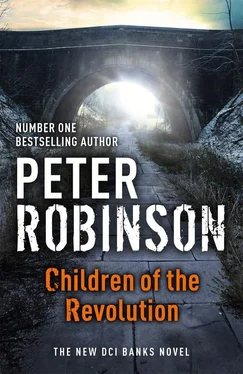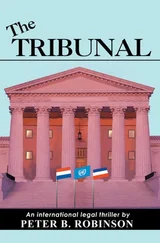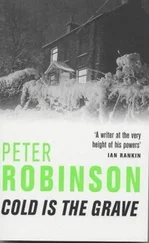Peter Robinson
Children of the Revolution
‘The past lies like a nightmare upon the present.’
Karl Marx, The 18th Brumaire of Louis Bonaparte
As Detective Chief Inspector Alan Banks walked along the disused railway track, he couldn’t help but imagine two young lovers kissing on the footbridge ahead, shrouded in smoke from a steam engine. All very Brief Encounter . But the Age of Steam was long gone, and it wasn’t love he was walking towards; it was a suspicious death.
Banks made his way towards the group of white-suited crime scene investigators standing outside a tent, lit from inside, just beyond the bridge. Other CSIs were working on the bridge itself; its rusted metal sides were so high that Banks could see only their heads and shoulders.
The crime scene lay half a mile south of the village of Coverton, which stood at the very limits of the North Yorkshire county line, at the tip of the Yorkshire Dales National Park across the A66 from Barnard Castle. The only way to get to the body, Banks had been told over the phone, was to walk along the old railway tracks or through the woods that ran parallel to them about fifty yards to the east.
The railway ran dead straight, a narrow, shallow, U-shaped valley cut into the landscape. The embankments were steep and grassy on both sides, and while there were plenty of weeds growing in the unkempt grass, no one had dumped prams, bicycle frames or refrigerators there, as people did in the more urban areas. The rails and sleepers had been taken up long ago, and the track had been paved over, though many of the flagstones were broken or uneven, and hardy weeds insinuated their way through the cracks. It seemed a long half mile to Banks, especially with the rain and wind whipping at him down the man-made valley. The only human dwelling Banks saw on his journey stood to his right, just before he got to the bridge: a small square cottage at the top of the embankment.
When Banks got to the outer cordon, he showed his warrant card to the officer on duty, who lifted the tape for him and handed him a hooded overall and shoe covers. Awkwardly, he took off his raincoat and put on the protective gear over his clothes. This area was where the CSIs and other officers not required at the immediate scene waited until they were needed. Only essential personnel were given access through the inner cordon to inside the tent itself, and as few people as possible were allowed there at a time.
Already, the CSIs were busy fixing up extra lights as the early November morning was overcast and dull. Banks poked his head inside the canvas flap and saw the Crime Scene Manager, Stefan Nowak, as immaculate as ever, and dry, along with Dr Burns, the police surgeon, and Detective Sergeant Winsome Jackman, all in their white coveralls. Peter Darby, the crime-scene photographer, crouched by the body taking photographs with his beat-up old Pentax, his state-of-the-art handycam in its waterproof case hanging over his shoulder. All except Darby turned to greet Banks. Suddenly, the tent seemed crowded, and its humid interior smelled like a wet dog.
Banks saw the crumpled body of an emaciated old man wearing a grey anorak and blue jeans lying on his back. His neck lay at an impossible angle, one arm was bent in the opposite way to which it should have been, and a sharp knife of bone protruded through the denim on his inner right thigh. His clothes were wet with rain. Banks wondered how long he had been there.
‘OK,’ Banks said to Winsome. ‘What happened? Run me through it.’
‘Dog walker found the body,’ Winsome said, without referring to her notebook. ‘Or rather, her dog did. Eight thirty-seven, to be precise.’
Banks checked his watch. It was five past ten. ‘That’s very precise.’
‘She’s a retired schoolteacher. Probably used to checking her watch every now and then to see when the lesson’s due to end.’
Banks laughed. ‘I never realised how the teachers might have hated classes as much as we did. I used to believe they existed just to bore and terrorise us.’
‘Children often take a very self-centred view of the world.’
‘Her name’s Margery Halton, sir,’ came a voice from just beyond the tent’s entrance flap. ‘Sorry for interrupting, but I’m PC Barry Kirwan, Coverton beat manager. I was first officer on the scene. Margery knows me. She came straight to my house, and I followed her up here and saw who it was, then I called it in.’
Banks walked back and ducked under the flap into the open. ‘Where is she now?’
‘One of the community support officers took her home, sir. Bit of a state.’
‘I’m not surprised,’ said Banks. ‘Who was he?’
‘Name’s Gavin Miller, sir.’
‘Local, then?’
PC Kirwan pointed. ‘Lived in that old signalman’s cottage just up there, other side of the bridge. You must have noticed it on your way here.’
Bank turned and looked at the squat cottage he had just passed. Bijou would be a kind description. ‘What do you know about him? What did he do for a living?’
‘Don’t know much about him at all, sir. Not much of a mixer. Kept himself to himself. Bit of an odd duck, or so the locals thought. Reclusive. Didn’t get out much. I don’t know how he made his living.’
‘Next of kin?’
‘No idea, sir. I mean, he lived alone. I suppose there might be someone...’
‘How long had he been living there?’
‘He bought the place three or four years ago. It had been up for sale for quite a while. The market was very sluggish, and I think he got a good price. As you’ll see, though, it’s not very big.’
Banks glanced at the embankment and the paved track. ‘So what’s the story of this place, PC Kirwan? What’s the lie of the land? How frequently is it used? What’s access like?’
‘We used to have a branch line here until Dr Beeching closed it in the early sixties. That was before my time, of course. Anyway, since then, it’s just fallen into... well, you can see for yourself. We get a few walkers in season, when the weather’s good — we’re not too far from the Coast-to-Coast — and maybe a few railway buffs, but not so many in these sort of weather conditions. It’s a pretty secluded spot, as you can see, and it doesn’t really lead anywhere.’ He pointed beyond the tent. ‘Keep going south and you’ll end up at a collapsed viaduct about a mile or so further on. Lark Woods are to the east, above the embankment, and there’s a woodland footpath that winds through the woods by the river to the back of the village car park. You can’t get a car within half a mile of here unless you really know the area. There are unsurfaced tracks and lanes, access to the signalman’s cottage, for example, but they’re not generally known, and none of them lead directly to or from Coverton, or anywhere else for that matter.’
‘So he could have been lying there undiscovered for a while?’
‘I suppose so, sir. But not for days, I wouldn’t say.’
‘All night, though?’
‘Easily.’
Banks thanked PC Kirwan, went back into the tent and turned to Winsome. ‘What’s the story here?’
‘PC Kirwan phoned in to report a suspicious death and suggested we get some cover out here quickly, just in case there was any evidence left that needed preserving. When I got to the scene, it was pretty obvious that our man hadn’t just dropped dead from a heart attack while he was out jogging, so... well, guv, you can see for yourself.’
Peter Darby stood up. ‘Done for now,’ he said, and left the tent.
Banks turned to Dr Burns. ‘Any idea what we’re dealing with, Doc?’
Burns pointed beyond the open tent flap to the bridge. ‘It would seem from his injuries, and the position of the body, that he fell off the bridge. I don’t think he’s been moved, but I haven’t had a chance to examine him fully for post-mortem lividity yet. Dr Glendenning will be able to give you a more accurate answer later, when he performs the post-mortem. As you can see, the sides of the bridge are quite steep, most likely for the benefit of the farm animals that cross, or used to cross, so an accidental fall is extremely doubtful. It’s about a thirty-foot drop, quite enough to cause the kind of injuries his body has sustained on the paved track. Broke his neck and several other bones. He’d lost a lot of blood from a head wound, too. And from the leg fracture, of course.’
Читать дальше












